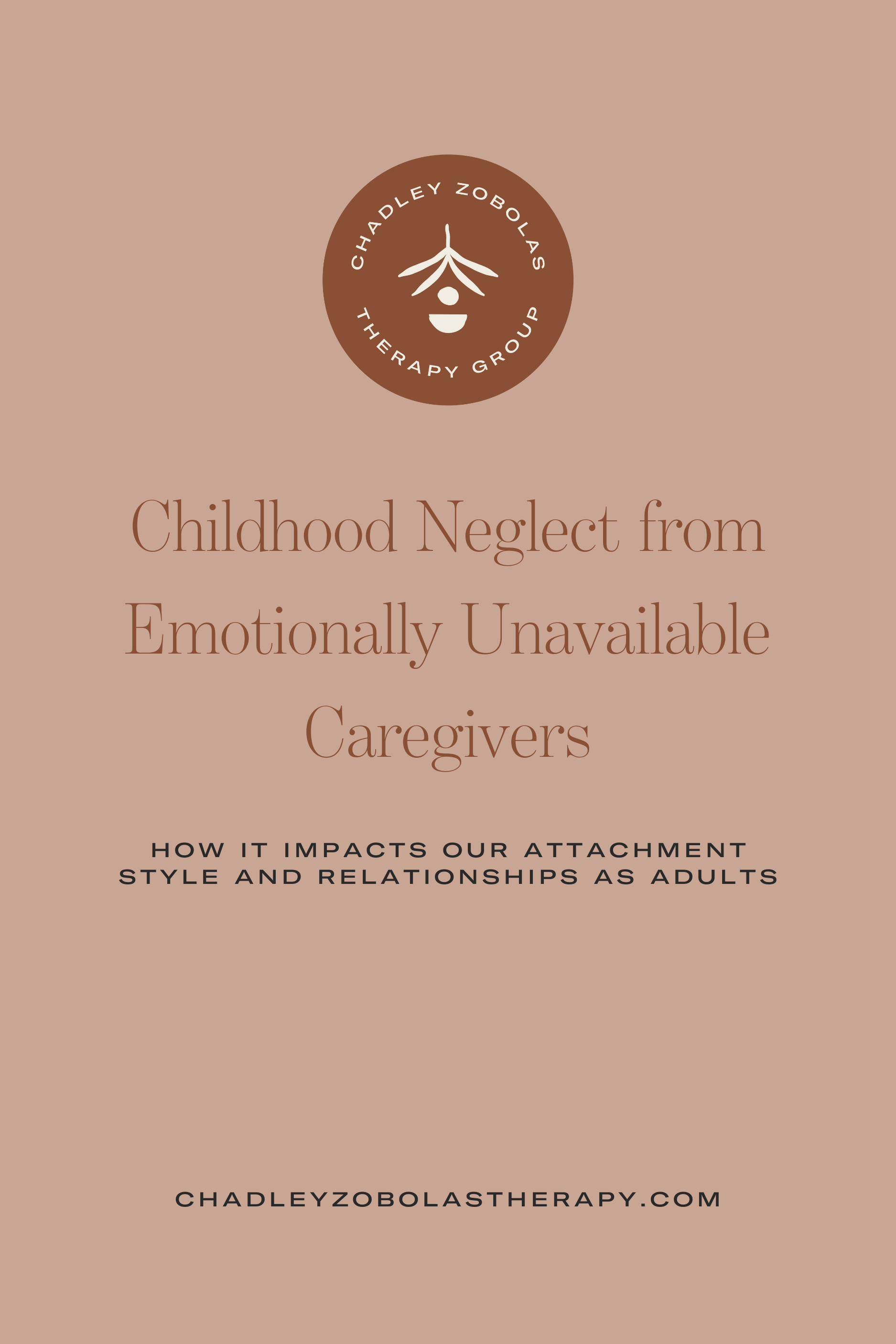Childhood neglect from emotionally unavailable caregivers: how it impacts our attachment style and relationships as adults
By a Denver Trauma therapist and Relationship expert
A bittersweet part of growing older is understanding that our parents were not perfect and that some of us might've had to navigate more difficult childhoods than others due to abuse, neglect, or generally chaotic or unsafe households. ‘
Childhood emotional neglect is a form of childhood trauma that can oftentimes get overlooked. Because it involves the lack of something, as opposed to the presence of abusive or unsafe dynamics that are obvious and tangible, we can tend to miss the impacts of emotional neglect, which can be just as harmful and long-lasting.
So today, I'd like to paint a vivid illustration of the impact that childhood emotional neglect can have on our adult relationships and attachment styles. The purpose of this blog is to provide helpful tools and resources to help us heal from the impacts of childhood emotional neglect so we can foster healthier connections with ourselves and the world around us.
Before we dive in, it's important to remember that acknowledging the imperfections of our childhood does not diminish the love and appreciation we have for our caregivers or ourselves. It simply allows us to gain a deeper understanding of who we are and empowers us to break generational patterns that may become harmful if left unchecked. By doing so, we can cultivate greater empathy and compassion, leading to more fulfilling relationships and a sense of inner peace. With that in mind, let's roll up our sleeves and dive deep into the strategies that can help us overcome childhood emotional neglect.
What is Attachment Theory in Trauma Counseling?
To begin this journey, it is essential to grasp your attachment style. But what exactly is an attachment style? It's more than just a trending topic or a question on a dating app.
Attachment theory is based on the idea that humans have an innate need to form attachment bonds with others for survival.
In this instance, survival refers to how we can move throughout the world, regulate our emotions, cope with stress and trauma, and seek support. By understanding our attachment style, we can:
gain insight into why we show up the way we do in relationships
understand why our emotional experiences in relationships with others make sense and are protective based on our childhood experiences
and through building more secure attachments, be able to create more fulfilling connections with ourselves and others
Four key attachment styles are important to know about when doing this work. Read below and see which one(s) resonates with you the most.
As a note: you may resonate with more than one attachment style. It can be helpful to think of them as attachment strategies instead - merely avenues we go down and tools we pull from to help us obtain and/or maintain a connection with others. They can - and often do - shift based on circumstance and relationship dynamics. You aren’t ever assigned to just one attachment style.
The Four Attachment Styles - Detailed by a Denver Trauma Therapist
Secure Attachment
Secure attachment is characterized by a sense of trust and security in relationships, stemming from consistent, predictable, and responsive caregiving during childhood. Parents of securely attached children are rarely (if ever) explosive, set and maintain clear and fair boundaries, validate their child’s emotions - no matter what they are - and help them learn how to express emotions fully. Parents of securely attached children tend to have their methods of self-growth and healing (ie therapy).
Individuals with a secure attachment style tend to have high self-esteem, are comfortable with intimacy and closeness, and can communicate their needs effectively. They also tend to have effective ways of coping with stress and conflict.
Anxious Attachment
Anxious attachment is characterized by a need for reassurance and attunement from others and a fear of losing others or not being good enough. Anxious attachment stems from inconsistent or unpredictable caregiving during childhood. Parents of anxiously attached children may show up as overly critical and insensitive in some moments and completely emotionally unavailable in others. This leaves children in the position of not being able to anticipate when their needs will be met by their caregiver or if their caregiver may cause even further emotional harm.
Individuals with an anxious - also referred to as preoccupied - attachment style tend to have low self-esteem, fear of abandonment, and struggle with trusting others. They may also have difficulty regulating their emotional experience and may be prone to anxiety or depression. All of this can make it hard for people with anxious-preoccupied attachment styles to find a sense of peace and stability in their relationships.
Avoidant Attachment
Avoidant attachment is characterized by a tendency to avoid emotional closeness and intimacy in relationships, stemming from a lack of emotional support and/or emotional neglect during childhood. Parents of avoidantly attached children are often unreachable, emotionally and often physically, and their children learn that they can’t rely on their caregiver to meet their basic emotional needs. As a result, their children often become hyper-independent out of necessity, share very little about their life with their caregivers, and may appear to those outside the family as emotionally withdrawn or ‘numbed out’.
As adults, individuals with an avoidant/dismissive attachment style tend to have high self-esteem, prioritize independence, and may struggle with expressing their emotions or connecting emotionally with others. In terms of impact on adult relationships, individuals with an avoidant attachment style may struggle with forming and maintaining healthy relationships due to their tendency to distance themselves emotionally from others as a way to protect themselves from hurt. They may have difficulty recognizing or expressing their own emotions as well as understanding the emotions of others, which can lead to misunderstandings and conflicts in relationships. As a result, individuals with an avoidant - also referred to as dismissive - attachment style may experience low levels of relationship satisfaction and stability.
Disorganized attachment
Disorganized attachment is characterized by a lack of consistent patterns in behavior and emotions, stemming from traumatic or abusive experiences during childhood. Parents of children with disorganized attachment are often verbally or physically abusive, volatile, and predictably unpredictable.
Individuals with a disorganized attachment style may exhibit contradictory behaviors such as seeking closeness with their partner while also avoiding them, or displaying both aggressive and passive behavior. They may experience intense emotional ‘ups in downs’ which can make it difficult to form and maintain healthy relationships. They may have difficulty trusting others and forming meaningful connections, in part due to a learned narrative of being undeserving of love, unworthy of togetherness, or another iteration of a similar narrative learned in childhood as a result of their caregivers’ actions. This can ultimately lead to intense feelings of isolation and loneliness. In addition, those with a disorganized attachment style resulting from childhood trauma may be more prone to mental health issues such as anxiety, depression, or post-traumatic stress disorder (PTSD).
How does childhood neglect affect us?
If we look closely, it is clear that our attachment style originates from childhood growth. It's worth noting how significant a role childhood neglect can have on the developing brain - an impact that cannot be overstated. One of the most significant effects of childhood emotional neglect is its impact on the way we deal with trauma and stress. When children experience chronic neglect or other forms of trauma, their stress response system can become overactive and dysregulated. This can lead to changes in brain chemistry and structure that increase the risk of mental health issues later in life, such as anxiety and depression. For example, studies have shown that neglected children may have smaller hippocampus (the area responsible for learning and memory) and prefrontal cortices (the area responsible for helping people achieve their goals). These structural changes can affect a child's ability to learn, regulate their nervous system and emotions, make decisions, and form healthy relationships with others.
When we experience neglect as children, it can leave us feeling emotionally disconnected, insecure, and mistrustful of others. If you endured childhood neglect, forming healthy relationships in adulthood may seem overwhelming. Nevertheless, don't be discouraged! With a bit of determination and the right support, this process is achievable. To get started on your journey to more secure attachment, consider some of these tips:
How do trauma therapists in Denver, CO suggest we heal from childhood neglect?
Write a letter to your younger self
Take time to reflect on your childhood experiences and write a letter of encouragement and compassion to your younger self. This can help you cultivate greater self-compassion and understanding for the younger you, your protective strategies, and your resilience.
Practice forgiveness
Forgive yourself for any negative patterns or behaviors that may have developed as a result of past trauma. Forgiveness can release the emotional burdens of shame, guilt, and resentment and allow for greater healing.
Engage in creative expression
Explore creative forms of self-expression, such as writing, painting, or music, as a way to process difficult emotions from childhood neglect. Engaging in creative expression can stimulate multiple parts of the brain and these brain regions may work together to help individuals process their experiences, regulate their emotions, and create new neural connections that support healing and growth.
Volunteer or mentor others
Giving back through volunteer work or mentoring can help you develop greater empathy, compassion, and connection with others.
Develop a self-soothing routine
Incorporate daily practices that bring solace to your soul into your routine, such as immersing yourself in a tranquil bubble bath, playing calming music, or diving into an inspiring book.
In sum: by using Trauma Counseling Denver, CO, to understand the root causes of trauma, we can break free from the cycles of neglect and find peace and clarity in our relationships and within ourselves.
Ultimately, even if our parents were unable to provide us with the care and attention required for healthy relationships, it's important to remember that we have the power to heal as adults, attune to the younger parts of ourselves that may still be hurting, and ultimately break free from the cycles of emotional neglect that were put onto us as children.
By becoming advocates for our healing, we can learn to form more secure attachments and build fulfilling relationships in all areas of our lives. The journey may be difficult, but the reward of greater happiness and connection is well worth it.
Moving Towards Secure Attachment and Healing from Childhood Emotional Neglect in Trauma Counseling Denver, CO
Overall, understanding common patterns across relationships and diving deeper into attachment theory can be an important step toward developing healthier relationships throughout your lifetime. If you're interested in support with this, let's connect! Our Denver-based therapists at Chadley Zobolas Therapy Group are ready to provide you with the tools and guidance you need to cultivate more secure attachments and build stronger relationships.
Whether you prefer in-person or virtual sessions, we will help you feel at ease as you embark on this journey of self-discovery and growth. Connect with us today to get started.
Get Started with Trauma Therapy in Denver, CO
1. Reach out to schedule a free 20-minute consult call.
2. Connect with the CZTG therapist of your choice via a phone consult.
3. Embark on a journey of self-discovery, healing, and personal growth.
Other CZTG Trauma Therapy Offerings
EMDR FOR TRAUMA Body Image THERAPY ANXIETY THERAPY TEEN THERAPY LGBTQ+ THERAPY
Seeking affirming trauma counseling in Denver, CO to help you or someone you love with emotionally unavailable caregivers? Reach out to connect with a trauma therapy Denver CO today!




